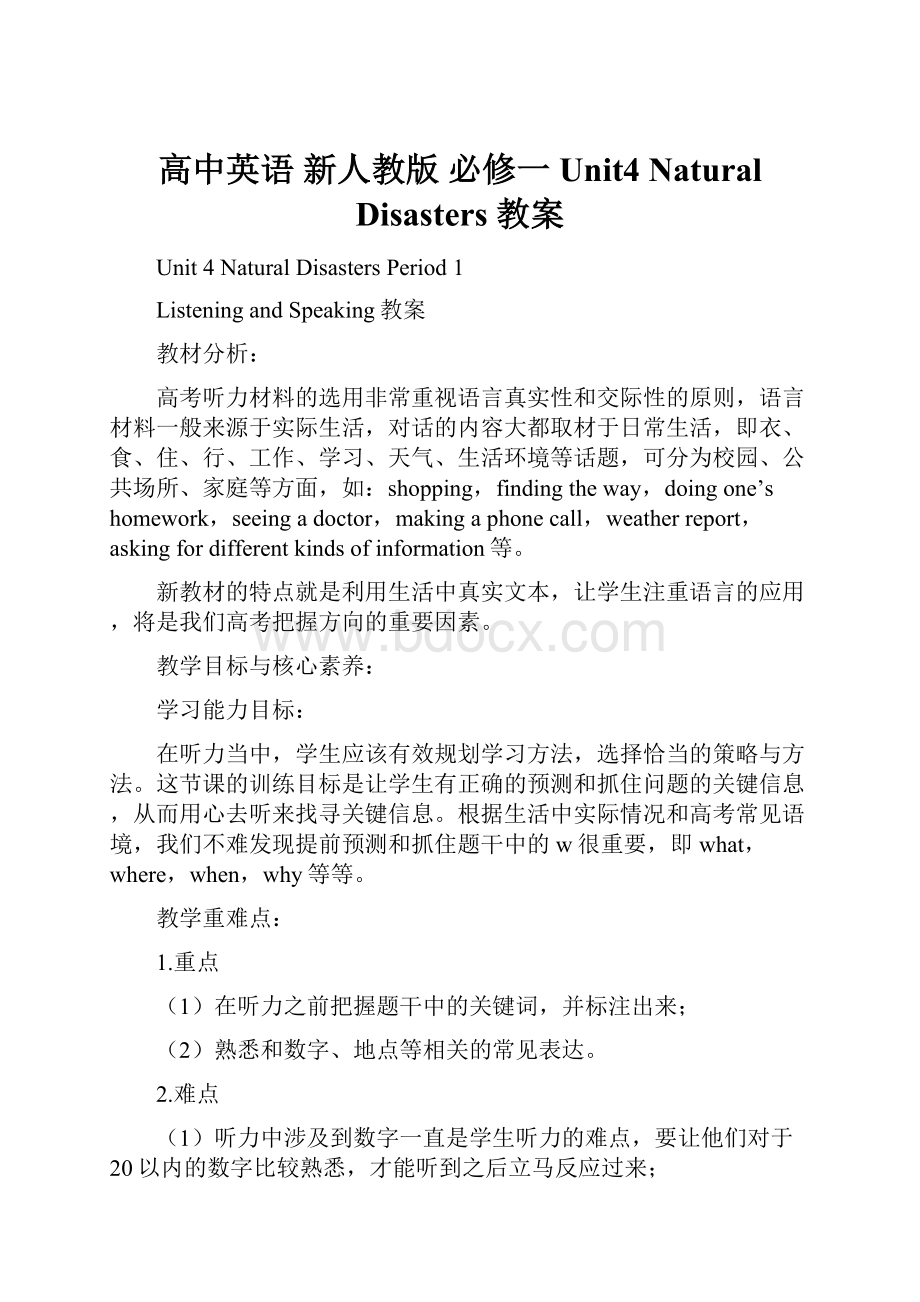高中英语 新人教版 必修一Unit4 Natural Disasters 教案.docx
《高中英语 新人教版 必修一Unit4 Natural Disasters 教案.docx》由会员分享,可在线阅读,更多相关《高中英语 新人教版 必修一Unit4 Natural Disasters 教案.docx(21页珍藏版)》请在冰豆网上搜索。

高中英语新人教版必修一Unit4NaturalDisasters教案
Unit4NaturalDisastersPeriod1
ListeningandSpeaking教案
教材分析:
高考听力材料的选用非常重视语言真实性和交际性的原则,语言材料一般来源于实际生活,对话的内容大都取材于日常生活,即衣、食、住、行、工作、学习、天气、生活环境等话题,可分为校园、公共场所、家庭等方面,如:
shopping,findingtheway,doingone’shomework,seeingadoctor,makingaphonecall,weatherreport,askingfordifferentkindsofinformation等。
新教材的特点就是利用生活中真实文本,让学生注重语言的应用,将是我们高考把握方向的重要因素。
教学目标与核心素养:
学习能力目标:
在听力当中,学生应该有效规划学习方法,选择恰当的策略与方法。
这节课的训练目标是让学生有正确的预测和抓住问题的关键信息,从而用心去听来找寻关键信息。
根据生活中实际情况和高考常见语境,我们不难发现提前预测和抓住题干中的w很重要,即what,where,when,why等等。
教学重难点:
1.重点
(1)在听力之前把握题干中的关键词,并标注出来;
(2)熟悉和数字、地点等相关的常见表达。
2.难点
(1)听力中涉及到数字一直是学生听力的难点,要让他们对于20以内的数字比较熟悉,才能听到之后立马反应过来;
(2)能够先通过读题,找到题干中的关键词。
教学过程:
教学步骤
教学活动
设计意图
时间
Step1Beforelistening
Doyouknowwhatthedisastersare?
这些图片可以激活学生的背景信息。
3分钟
Step2Listeningforthe1sttime
1sttimelistening:
Listentothenewsreportsandtickthedisastersthatyouhear.
第一次听之前要先明确问题,熟悉话题背景。
认识本单元相关话题词汇
5分钟
Step3Listeningforthe2ndtimeand3rdtimeifnecessary.
Circlethekeyword(s)inthequestionsbelowandwritethekindofinformationtheyreferto.Thenlistenagainandanswerthequestions.
notes:
Thinkaboutwhatyouarelisteningforbeforeyoulisten.
Listenforthe2ndtimetogettheanswer.Listenforthe3rdtimeifnecessary.
这个部分让学生在听力练习中能够快速找到句中提问的关键词从而有的放矢去听材料。
排除具体语境下的干扰,听寻关键信息的答案。
20分钟
Step4Speaking
Readaboutthedisastersbelowandprepareashortnewsreportononeofthem.Thenpresentyournewsreporttoapartner.
这个部分是教会学生通过提供的关键信息,比如when,where,why,what等信息来连接信息进行整合成一句话新闻。
7分钟
Step5Pronunciationfocus
Listenandrepeat
Payattentiontothelettersinbold.
Readthewordsaloud.Payattentiontothepronunciationofthe-edendings.
本单元语音知识有两个:
一是区分清辅音和浊辅音,能够感到声带的振动与否。
二是了解不同动词的过去式加了-ed读法的些许不同。
5分钟
Step6Homework
Trytofinishthelisteningexercise.
作业中补充练习听力,巩固今天主语学习内容:
快速找到剧中的关键信息。
Unit4NaturalDisastersPeriod2
ReadingandThinking教案
教学目标与核心素养:
1.Teachstudentstofindouttheparagraphtopicsentences,understandthebasicinformationoftheTangshanearthquakethroughskimming,searchingandotherreadingskills.
2.Enablestudentstosortoutthedetailsoftheparagraph,tounderstandthestrangethingsbeforetheTangshanearthquake,thetremendousdestructiveforcecausedbytheearthquake,andtherapidandselflessrescueandreconstructionafterthedisaster.
3.Discussthethinkingbroughtbyearthquakeandsublimatethethemesignificance.
教学重难点:
1.Developstudents’readingabilitysuchasskimming,scanningandsummarizing.
2.Letstudentstalkabouttheprecursorbeforetheearthquake,thedamagecausedbytheearthquake,therescueaftertheearthquakeandthereconstructionaftertheearthquake.
教学过程:
Step1Activity1
Activatingbackgroundinformation
T:
Todaywearegoingtolearnapassagewiththetitle“TheNighttheEarthDidn’tSleep”.Sowhydidn’ttheearthsleeponthatnight?
Whathappenedtotheearth?
ActuallythereisamoviedirectedbyFengXiaogangfocusesonthesameearthquake.Now,I’dliketoshowyouashortclipofthemovie.
1.Talkabouttheearthquake
Q1:
Whatdoyoulearnfromthevideo?
2.TalkaboutTangshanearthquake.
Q1:
WhatdoyouknowaboutTangshanearthquake?
Q2:
Whatdoyouwanttoknowaboutit?
Step2Activity2
Readingtogetsomebasicinformationaboutearthquake
1.Readquicklytofindtheanswerstothestudents’ownquestions.
2.Readforthetopicsentencesandworkouttheorganizationofthetext.
Q1:
What’sthetopicsentenceineachparagraph?
Q2:
Inwhatorderdoestheauthordescribetheearthquake?
Step3Activity3
Readingfordetailedinformation
1.ReadtogetdetailedinformationaboutParagraph1.
Q1:
Whatwerethestrangethings?
Q2:
Whatwaspeople’sreactiontothesestrangethings?
Q3.Whydidn’tpeoplepayattentiontothesestrangethings/thesignsbeforetheearthquake?
T:
Peoplehadlittleknowledgeofearthquakeatthattime.
Q4:
Whendoesthisparagraphmainlytalkabout?
T:
Abnormalsignsbeforetheearthquake.
2.ReadtogetdetailedinformationaboutParagraph2.
Q1:
Howstrongwastheearthquake?
Q2:
Howdidthepeoplefeelwhentheearthquakehappened?
Q3:
Whatdoesthisparagraphmainlytalkabout?
3.ReadtogetdetailedinformationaboutPara.3.
Q1:
Whatweredestroyed?
Q2:
Howdoesthewriterdescribe“everythinginthecity”?
Q3:
Howdidthepeoplefeel?
Q4:
Whatdoesthisparagraphmainlytalkabout?
4.ReadtogetdetailedinformationaboutParagraph4.
Q1:
Whobroughthopeback?
Andwhatdidtheydo?
Q2:
Howdidthepeoplefeelafteralotofpeoplecametorescue?
Q3:
Howwasthecityafteralotofpeoplecametorescue?
5.ReadtogetdetailedinformationaboutParagraph5.
Q1:
WhatshowstherevivalofTangshan?
Q2:
HowcanTangshanreviveitselfandgetuponitsfeetagain?
Q3:
Intimesofdisasters,howcanwegothroughit?
T:
Intimesofdisasters,weshouldunify,showthewisdomandstaypositive.
Step4Activity4
Highlightingthethemeandreflecting
1.Makeasummaryofthetext.
time
whathappened
people’sresponse
before
during
after
2.Furtherunderstandthetitle
Q:
Afterourlearning,whydoyouthinktheearthdidn’tsleeponthatnight?
T:
Anearthquakehappened.Thepeopleintheearthquakesufferedalot,andthepeopleoutsideTangshanwereconcernedaboutthepeopletherealot.
3.Reflectthroughdiscussiononwhatcanbelearntafterreading.
T:
Disastersarepowerful.Unpreparednesscanbedeadly.Lifeisweak,butifpeopleworktogethertohelpeachother,disasterscanbedefeated.
Thereisnolovefromdisaster,butwehaveloveinthehumanheart.
Step5Assignment
Howdoesthewriterconveythattheearthquakewasdeadly,andthatpeoplewerehelplessduringtheearthquake?
Trytofindsomeattractiveandimpressiveexpressionsandnotethemdown.
Unit4NaturalDisastersPeriod3
DiscoveringUsefulStructures教案
教材分析:
Thisteachingperiodmainlydealswiththegrammar:
therestrictiverelativeclauses.
Thisperiodcarriesconsiderablesignificancetothecultivationofstudents’writingcompetenceandlaysasolidfoundationforthebasicappreciationoflanguagebeauty.Theteacherisexpectedtoenablestudentstomasterthisperiodthoroughlyandconsolidatetheknowledgebydoingsomeexerciseofgoodquality.
教学目标与核心素养:
1.Getstudentstohaveagoodunderstandingofthebasicusagesoftherestrictiverelativeclauses.
2.Enablestudentstousetherestrictiverelativeclausesflexibly.
3.Developstudents’speakingandcooperatingabilities.
4.Strengthenstudents’greatinterestingrammarlearning.
教学重难点:
Howtoenablestudentstohaveagoodunderstandingoftherestrictiverelativeclauses,especiallytheusesoftherelativewordssuchaswhich,that,who,whom.
教学过程:
Step1语法知识呈现
定语从句
(一)——关系代词的用法
在复合句中,修饰名词或代词的从句叫定语从句。
定语从句通常由关系代词或关系副词引导,说明事物的具体信息,从句位于被修饰词之后。
被定语从句修饰的词叫先行词,引导定语从句的词叫关系词,关系词指代先行词,并在定语从句中充当成分。
关系词有两种:
关系代词who,whom,whose,that,which,as和关系副词when,where,why。
根据定语从句与先行词的关系,可将定语从句分为限制性定语从句和非限制性定语从句。
一般说来,限制性定语从句是整个句子不可缺少的部分,如果省略会影响全句的主要意思,这种定语从句前面不用逗号隔开;而非限制性定语从句的作用是对所修饰的成分作进一步说明,通常和主句用逗号隔开,将从句去掉后句子的意思仍然完整,译成汉语时,从句常单独译成一句话,除了that和why不能引导非限制性定语从句,其他关系词的用法和限制性定语从句关系词的用法相同。
一、判断定语从句的关系代词的方法
如果名词或代词后有一个句子,并且该名词或代词在句子中充当成分,则该句子就是定语从句。
主要按照以下三步来判断:
1.找准先行词(定语从句前的名词或代词)。
2.把先行词还原到定语从句中,看充当什么成分。
3.根据先行词在定语从句中所充当的成分以及句意来选用适当的引导词。
如果先行词在从句中作主语,宾语,定语,表语,则用关系代词,关系代词主要有who,whom,whose,that,which,as。
二、关系代词的基本用法
指代
关系代词以及在定语从句中充当的成分
例句
1.人
who(主语、宾语)
whom(宾语)
that(主语、宾语)
Themanwho/thatisspeakingatthemeetingisafamousscientist.(作isspeaking的主语)
在会上讲话的人是一位著名的科学家。
Hewho/thatdoesnotreachtheGreatWallisnotatrueman.(作doesnotreach的主语)
不到长城非好汉。
Thisisthefamousscientist(who/whom/that)wevisitedlastweek.(作visited的宾语)
这就是我们上周拜访的那位著名科学家。
Themanwho/thatisspeakingatthemeetingisafamousscientist.(作isspeaking的主语)
在会上讲话的人是一位著名的科学家。
Hewho/thatdoesnotreachtheGreatWallisnotatrueman.(作doesnotreach的主语)
不到长城非好汉。
Thisisthefamousscientist(who/whom/that)wevisitedlastweek.(作visited的宾语)
这就是我们上周拜访的那位著名科学家。
2.物
that(主语、宾语)
which(主语、宾语)
Hefinallyworkedouttheproblemwhich/thatpuzzledhimforalongtime.(作puzzled的主语)
他最后解出了这个令他困惑很久的问题。
Thefish(that/which)weboughtyesterdaywerenotfresh.(作bought的宾语)
我们昨天买的鱼不新鲜。
3.人的;物的
whose(定语)
Theyrushedovertohelpthemanwhosecarbrokedown.(whosecar=theman’scar,作定语,修饰car)
他们跑过去帮助那个汽车抛锚的人。
Thereisamountainwhosetopisalwayscoveredwithsnow.(whosetop=themountain’stop,作定语,修饰top)
有一座山顶常年被雪覆盖的山。
4.句子
(在非限制性定语从句中)
which(主语、宾语)
as(主语、宾语)
Theweatherturnedoutverygood,whichwasmorethanwecouldexpect.(which指代“天气最后晴朗起来”,作was的主语)
天气最后晴朗起来,这是我们没有料到的。
Aseveryoneknows,Chinaisabeautifulcountrywithalonghistory.(As指代“中国是一个有着悠久历史的美丽国家”,作knows的宾语)
每个人都知道,中国是一个有着悠久历史的美丽国家。
三、关系代词易错点
1.关系代词的省略
关系代词在定语从句中作主语时,不可省略;做宾语时,在限制性定语从句中可以省略,在非限制性定语从句中不可省略。
Ishethemanwho/thatwantstoseeyou?
(作wants的主语不可省略)
他就是那个想见你的人吗?
Hangzhouisabeautifulcity(that/which)Ialwayswanttovisit.(在限制性定语从句中作visit的宾语,可以省略)
杭州是我总想参观的一个美丽城市。
Hangzhou,whichIvisitedlastweek,isabeautifulcity.(在非限制性定语从句中作visited的宾语,不可省略)
杭州是一个美丽的城市,我上周去参观过。
2.从句中代词的重复多余
定语从句中的引导词指代先行词,并在从句中作成分,从句中不能再出现指代该先行词的代词。
ThebookthatIreadityesterdayisveryinteresting.(×)
ThebookthatIreadyesterdayisveryinteresting.(√)
我昨天读的那本书很有趣。
ThisisthewomanwhoImetherlasttime.(×)
ThisisthewomanwhoImetlasttime.(√)
这就是我上次遇见的妇女。
3.关系代词和代词的误用
定语从句的引导词要用关系代词,而不能用一般代词。
Thisistheboyhetoldmeastoryyesterday.(×)
Thisistheboywhotoldmeastoryyesterday.(√)
这就是昨天给我讲故事的男孩。
Thisistheboyhisfatherisourheadmaster.(×)
Thisistheboywhosefatherisourheadmaster.(√)
这就是这个男孩,他的爸爸是我们的校长。
4.wh